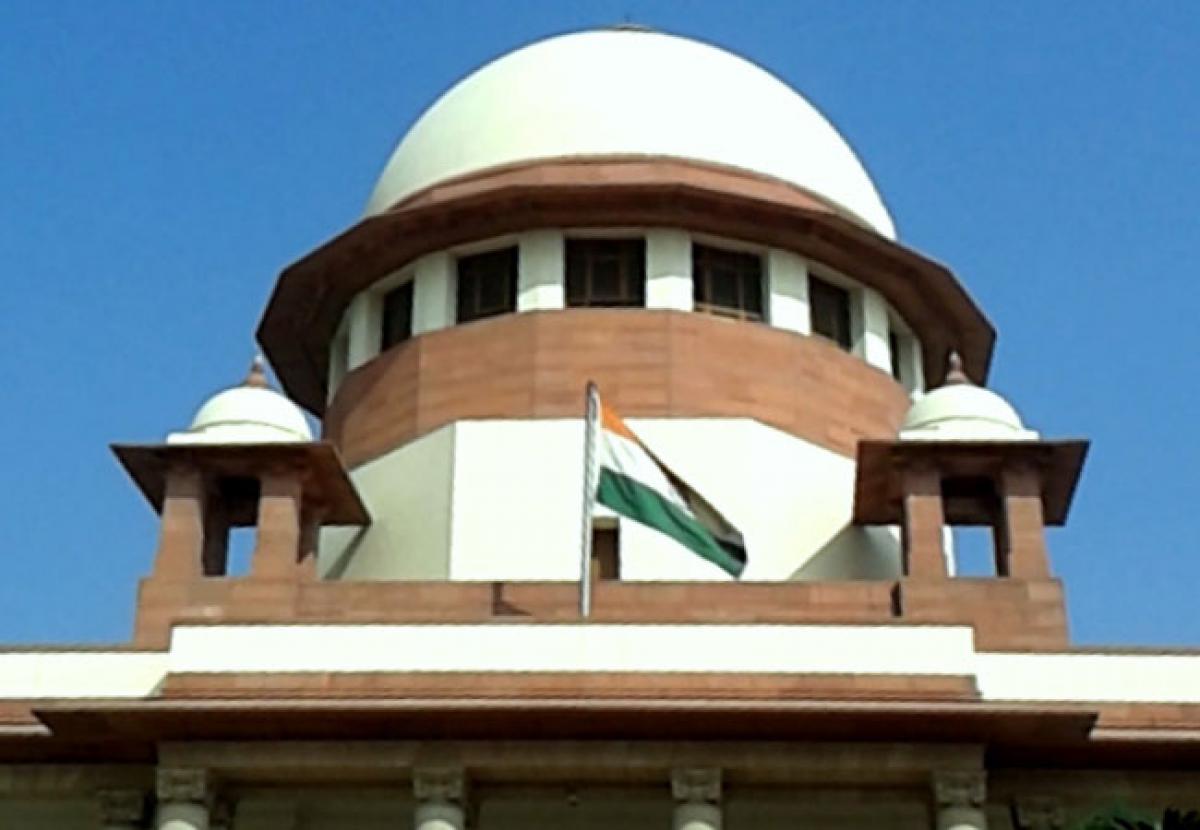Live
- Chanchalguda Jail Officials Say They Haven't Received Bail Papers Yet, Allu Arjun May Stay in Jail Tonight
- BJP leaders present evidence of illegal voters in Delhi, urge EC for swift action
- Exams will not be cancelled: BPSC chairman
- Nagesh Trophy: Karnataka, T.N win in Group A; Bihar, Rajasthan triumph in Group B
- YS Jagan condemns the arrest of Allu Arjun
- Economic and digital corridors to maritime connectivity, India and Italy building vision for future, says Italian Ambassador
- SMAT 2024: Patidar's heroics guide Madhya Pradesh to final after 13 years
- CCPA issues notices to 17 entities for violating direct selling rules
- Mamata expresses satisfaction over speedy conviction in minor girl rape-murder case
- Transparent Survey Process for Indiramma Housing Scheme Directed by District Collector
Just In

Fifteen years after its verdict that the confidence of litigants would be shaken if judgments were kept pending for years, the Supreme Court recently refused to share information under the RTI Act on the cases reserved for judgment. It also dismissed a plea to maintain the data on its pending judgments and make the information public under the RTI Act.
Apex Court refuses to share pending ruling data
Fifteen years after its verdict that the confidence of litigants would be shaken if judgments were kept pending for years, the Supreme Court recently refused to share information under the RTI Act on the cases reserved for judgment. It also dismissed a plea to maintain the data on its pending judgments and make the information public under the RTI Act.
Closing the option for litigants and public-spirited persons to know details of cases which have been waiting endlessly for final decision, even though arguments are long over, the apex court refused to interfere with a Delhi High Court decision which said the court registry could not be directed to collect information on how long judgments on cases remained pending under the Right to information Act.
After a case is heard by a court, it reserves its verdict in the case. There is a certain time gap between this and declaration of the court’s decision or judgment. The case remains pending till the judgment is delivered. However, the Supreme Court’s refusal to be made accountable under the RTI Act is despite the Central Information Commission (CIC) ruling to disclose the number of pending or “reserved” judgments.
The CIC also informed the Supreme Court that the total number of cases in which orders are reserved should be duly intimated to the public and as the benefit of computerisation is available with Supreme Court, placing such data in the public domain should not be particularly difficult. The Commission’s decision was upheld by a single judge of the Delhi High Court in a case in which the Supreme Court itself was an opposing party.
Besides this, the single judge’s order was set aside by a Division Bench, following an appeal by the Registrar representing the Supreme Court.
On January 7, RTI activist Lokesh Batra, approached the apex court against the Delhi HC order in order to know whether information of such cases is available with the highest court of the land and sought to be supplied a copy of the same. Dismissing the appeal by Batra, a Bench comprising Justices PC Ghose and Amitava Roy found no fault in the HC decision, which held that such information was not available with the apex court.
Interestingly, when Batra had first approached the Central Information Commission (CIC) for the said information under the RTI, the Delhi High Court readily supplied the list while the Supreme Court refused. Despite CIC order to part with information, the Supreme Court refused to budge and filed an appeal against the CIC order of August 3, 2011. After a single judge upheld the CIC order, the SC remained adamant and filed an appeal before the Division Bench of Delhi HC that finally reversed the decision by CIC and the single judge.
Finding it strange how the SC could shut litigants from seeking this basic information, advocates Prashant Bhushan, appearing for Batra, found it hard to believe that the apex court did not maintain this information. According to him, in the HC, Registrar of Supreme Court had admitted that the said information exists.
Bhushan told the apex Bench that dismissal of the appeal would go against its own decision of 2011 in Anil Rai v State of Bihar, where the top court noted with some concern the undue delay in pronouncing judgments. The ruling had also pointed out that, “Delay in disposal of the cases facilitates the people to raise eyebrows, sometimes genuinely which, if not checked, may shake the confidence of the people in the judicial system.”
The said judgment even laid down guidelines which set a six-month period for a judgment to be pronounced pursuant to which litigants in a particular case could approach the Chief Justice of the particular High Court complaining of delay and even seek the case transfer to another bench.
Interestingly, Delhi and Bombay High Courts maintain data on their judgments on both dates i.e., on which a judgment was reserved and when the judgment was delivered.
Over the last few months, the Supreme Court declared that information on banks collected by the Reserve Bank of India and entrance tests for state public service commission’s would be available under the RTI Act, widening the scope for transparency. However, in July last year, the court refused to entertain a plea seeking details on medical expenses of judges.
It is mandatory for the Supreme Court to furnish the quarterly RTI return form to the CIC, as seen from the latest report ending third quarter of 2015. It appears that 655 requests were received, of which 147 appeals were rejected or kept pending and the remaining were accepted.

© 2024 Hyderabad Media House Limited/The Hans India. All rights reserved. Powered by hocalwire.com







